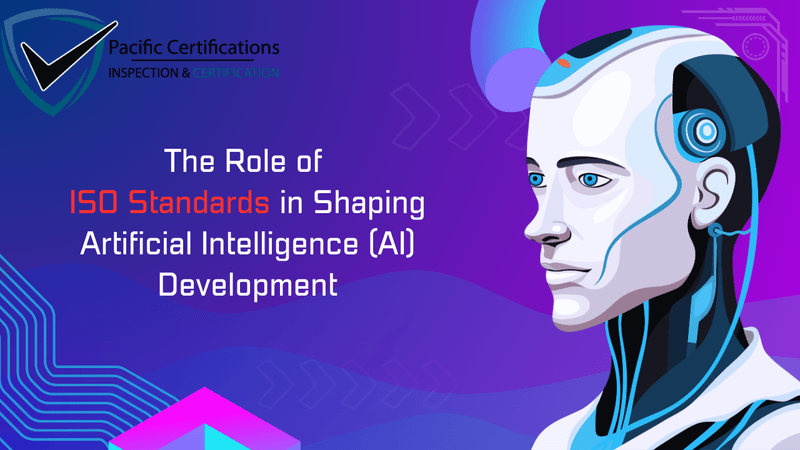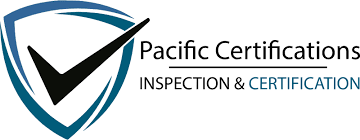The Role of ISO Standards in Shaping Artificial Intelligence (AI) Development

Introduction
As Artificial Intelligence (AI) continues to transform industries across the globe, the need for regulatory frameworks and standards has become more critical than ever. AI’s rapid development raises concerns about ethics, security, privacy, and transparency. In response to these challenges, ISO (International Organization for Standardization) has introduced several standards to guide the safe, secure, and responsible development of AI technologies.
For more information on how Pacific Certifications can assist with ISO certifications related to AI, contact [email protected].
Key ISO Standards Applicable to AI Development
There are several ISO standards that play a critical role in shaping the development of AI technologies. These standards help organizations ensure that their AI systems are secure, ethical, and compliant with both national and international regulations.
ISO/IEC 27001: Information Security Management Systems (ISMS)
AI systems often process vast amounts of sensitive data, which makes them prime targets for cyberattacks. ISO/IEC 27001 is an essential standard for ensuring that AI systems are developed with a robust information security framework in place. This standard provides guidelines for managing and protecting sensitive information through risk management, ensuring that the AI systems remain secure and protected from external threats.
Key Requirements:
- Establishing a documented information security management system (ISMS).
- Conducting regular risk assessments and implementing appropriate controls.
- Ensuring access control to sensitive data used in AI systems.
- Incident management processes for responding to security breaches.
For more on ISO/IEC 27001 certification for AI security, contact [email protected].
ISO/IEC 23894: Artificial Intelligence — Risk Management
AI technologies come with inherent risks, such as bias, data misuse, and unintended consequences in decision-making. ISO/IEC 23894 is an emerging standard focused on the management of risks specific to AI systems. This standard helps organizations identify, evaluate, and mitigate risks associated with AI development and deployment.
Key Requirements:
- Identifying potential risks and categorizing them based on impact and probability.
- Establishing mitigation strategies for AI-related risks (e.g., bias, transparency issues).
- Regularly reviewing and updating risk management strategies based on new data or technology updates.
- Documenting all risk management processes and decisions.
To learn more about ISO/IEC 23894 certification for AI risk management, contact [email protected].
ISO/IEC 38507: Governance of Artificial Intelligence
The governance of AI systems is essential for ensuring that they are aligned with organizational goals and comply with legal and ethical standards. ISO/IEC 38507 provides guidelines for governing AI, focusing on establishing clear accountability, transparency, and control mechanisms within organizations using AI.
Key Requirements:
- Establishing clear roles and responsibilities for AI governance.
- Implementing transparency measures to ensure accountability in AI decision-making.
- Monitoring and auditing AI system performance to ensure compliance with governance standards.
- Ensuring ethical principles (e.g., fairness, transparency) are integrated into AI development processes.
For guidance on how to achieve ISO/IEC 38507 certification for AI governance, contact [email protected].
ISO/IEC 25010: System and Software Quality Requirements and Evaluation (SQuaRE)
AI systems rely heavily on software, and the quality of the software plays a critical role in ensuring reliable and safe AI operation. ISO/IEC 25010 defines the quality attributes that AI software should meet, such as functionality, reliability, usability, efficiency, maintainability, and security.
Key Requirements:
- Ensuring that the AI system meets predefined functional requirements.
- Monitoring the system for reliability and minimizing downtime or errors.
- Conducting regular usability evaluations to ensure the system is user-friendly.
- Ensuring the AI system is secure from vulnerabilities and meets data protection requirements.
To achieve ISO/IEC 25010 certification, contact [email protected].
ISO/IEC 27701: Privacy Information Management Systems (PIMS)
AI systems often process vast amounts of personal data, making privacy management a critical concern. ISO/IEC 27701 builds upon ISO/IEC 27001 and provides specific guidelines for managing personally identifiable information (PII) within AI systems. This standard ensures that organizations comply with global privacy regulations such as GDPR.
Key Requirements:
- Implementing a privacy information management system (PIMS) to manage PII.
- Ensuring data minimization in AI systems to limit the use of unnecessary PII.
- Providing transparency to data subjects regarding the use of their personal data in AI applications.
- Establishing controls to protect PII from unauthorized access or breaches.
For assistance with ISO/IEC 27701 certification for AI-related privacy concerns, contact [email protected].
How ISO Standards Shape AI Ethics and Governance?
One of the critical aspects of AI development is ensuring that AI systems operate ethically. This involves preventing biases, ensuring transparency, and making sure that AI systems are accountable for their decisions. ISO standards help create frameworks for ethical AI by setting clear guidelines for how AI systems should be designed, deployed, and governed.
For example, ISO/IEC 38507 emphasizes the need for transparency and accountability in AI systems. This standard ensures that AI-driven decisions can be traced back to their source, making organizations accountable for their AI systems' actions. Similarly, ISO/IEC 23894 encourages companies to identify and mitigate biases in AI models, ensuring that AI outputs are fair and unbiased.
By following these standards, organizations can build AI systems that are not only efficient and reliable but also ethical and transparent. This fosters trust among users and stakeholders and ensures compliance with legal and regulatory requirements.
Benefits of ISO Standards for AI Development
Organizations developing AI systems can gain several benefits from adhering to ISO standards:
Data Security and Privacy
AI systems process large amounts of sensitive data, including personal information. By following ISO standards like ISO/IEC 27001 and ISO/IEC 27701, organizations can protect this data from breaches and ensure compliance with data privacy regulations such as GDPR.
Trust and Transparency
By adhering to standards like ISO/IEC 38507, organizations can ensure that their AI systems are transparent and accountable. This helps build trust with customers, regulators, and other stakeholders, as they can be confident that the AI system operates ethically.
Risk Mitigation
Standards like ISO/IEC 23894 help organizations identify and mitigate risks associated with AI development, such as bias, data misuse, and decision errors. This reduces the chances of legal and ethical issues arising from the use of AI technologies.
Marketing advantage
ISO certifications signal that an organization is committed to high standards in AI development. This gives companies a competitive edge by demonstrating their commitment to quality, security, and ethical practices.
Compliance with Global Regulations
Adhering to ISO standards ensures compliance with international regulations, including data protection laws and industry-specific requirements. This reduces the risk of legal penalties and ensures smooth global operations.
Market Trends
The AI landscape continues to evolve rapidly, with new trends and technologies emerging regularly. In 2025, we are seeing increased attention to AI ethics, particularly in the context of generative AI models and their potential for misuse.
There is also a growing focus on AI transparency, with regulators around the world pushing for greater disclosure of how AI systems make decisions. These trends underscore the importance of adhering to ISO standards, which provide the necessary framework for addressing these challenges.
As AI continues to advance, the role of ISO standards in ensuring its safe, ethical, and effective use cannot be overstated. Organizations that adopt these standards not only mitigate risks but also build trust with stakeholders and enhance their reputation in the marketplace. At Pacific Certifications, we are committed to helping organizations navigate the complex landscape of AI standards, providing expert auditing and certification services that ensure compliance with the latest ISO guidelines.
If your organization is involved in AI development or deployment, achieving ISO certification can set you apart as a leader in this rapidly growing field. Contact Pacific Certifications today to learn more about our AI-related certification services and how we can help you achieve compliance with the latest ISO standards!
Organizations developing AI systems can gain several benefits from adhering to ISO standards:
Data Security and Privacy
AI systems process large amounts of sensitive data, including personal information. By following ISO standards like ISO/IEC 27001 and ISO/IEC 27701, organizations can protect this data from breaches and ensure compliance with data privacy regulations such as GDPR.
Trust and Transparency
By adhering to standards like ISO/IEC 38507, organizations can ensure that their AI systems are transparent and accountable. This helps build trust with customers, regulators, and other stakeholders, as they can be confident that the AI system operates ethically.
Risk Mitigation
Standards like ISO/IEC 23894 help organizations identify and mitigate risks associated with AI development, such as bias, data misuse, and decision errors. This reduces the chances of legal and ethical issues arising from the use of AI technologies.
Marketing advantage
ISO certifications signal that an organization is committed to high standards in AI development. This gives companies a competitive edge by demonstrating their commitment to quality, security, and ethical practices.
Compliance with Global Regulations
Adhering to ISO standards ensures compliance with international regulations, including data protection laws and industry-specific requirements. This reduces the risk of legal penalties and ensures smooth global operations.
Conclusion
ISO standards play an important role in ensuring that AI systems are developed in ways that are transparent, ethical, and secure. These standards help organizations navigate the complexities of AI development, addressing key concerns such as data privacy, algorithmic fairness, and system reliability.
For more information on how Pacific Certifications can assist with ISO certifications related to AI, contact [email protected].
Contact Us
Pacific Certifications is accredited by ABIS, in case you need support with ISO certification for your AI Industry business, please contact us at [email protected] or +91-8595603096.
Ready to get ISO certified?
Contact Pacific Certifications to begin your certification journey today!
Suggested Certifications –
Read more: Pacific Blogs

